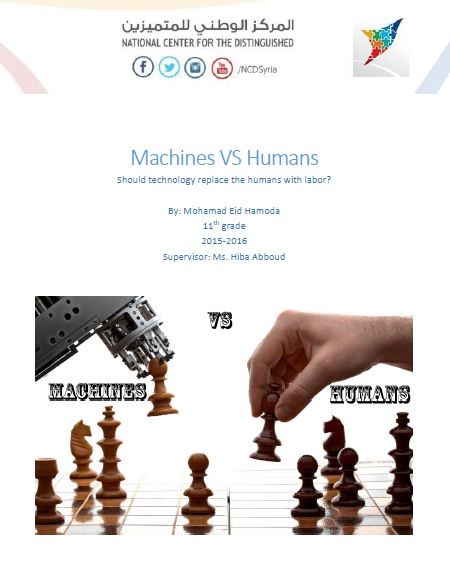الصف :الحادي عشر - العام الدراسي :2015/2016
We’re clearly heading into an age of brilliant technology. Computers are already impressively good at guiding driverless cars and beating humans at chess. As Erik Brynjolfsson and Andrew McAfee of the Massachusetts Institute of Technology point out in their book “The Second Machine Age,” computers are increasingly going to be able to perform important parts of even mostly cognitive jobs, like picking stocks, diagnosing diseases and granting parole.
As this happens, certain mental skills will become less valuable because computers will take over. Having a great memory will probably be less valuable. Being able to be a straight-A student will be less valuable — gathering masses of information and regurgitating it back on tests. So will being able to do any mental activity that involves following a set of rules.
The age of brilliant machines seems to reward a few traits. First, it rewards enthusiasm. The amount of information in front of us is practically infinite; so is that amount of data that can be collected with new tools. The people who seem to do best possess a voracious explanatory drive, an almost obsessive need to follow their curiosity. Maybe they started with obsessive gaming sessions, or marathon all-night study sessions, but they are driven to perform extended bouts of concentration, diving into and trying to make sense of these bottomless information oceans.
In his book, “Smarter than You Think,” Clive Thompson describes the work of Deb Roy, who wired his house with equipment so he and his team could monitor and record every word he and his wife uttered while his son was learning to speak. That is total commitment and total immersion in an attempt to understand the language learning process.[1]
Second, the era seems to reward people with extended time horizons and strategic discipline. When Garry Kasparov was teaming with a computer to play freestyle chess (in which a human and machine join up to play against another human and machine), he reported that his machine partner possessed greater “tactical acuity,” but he possessed greater “strategic guidance.”
That doesn’t seem too surprising. A computer can calculate a zillion options, move by move, but a human can provide an overall sense of direction and a conceptual frame. In a world of online distractions, the person who can maintain a long obedience toward a single goal, and who can filter out what is irrelevant to that goal, will obviously have enormous worth.
But can we completely replace humans with machines?
What are the positives and negatives of replacing humans with machines?
And finally should we replace humans with machines?
[1]“Smarter than You Think,” Clive Thompson, 2013.
-
 حلقة بحث98
حلقة بحث98Machines VS Humans

